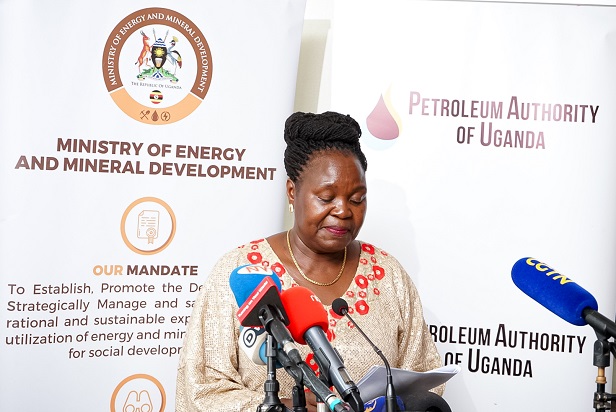The Energy and Mineral Development Minister, Ruth Nankabirwa addressing Journalists at Amber House on Tuesday
Uganda has kicked off consultations with Tanzania to allow the Uganda National Oil Company to market and handle fuel imports.
The latest move comes after declined to issue Uganda National Oil Corporation (UNOC) a license to operate as a local oil marketer.
Energy And Mineral Development Minister, Ruth Nankabirwa confirmed that she met the Tanzanian President, Samia Suluhu Hassan with a message from President Museveni.
She said there is the possibility of a negotiation with the government of Tanzania to remove some taxes on fuel imports so that Uganda imports its fuel from Tanzania.
Nankabirwa made the remarks on Tuesday while briefing journalists about the oil and gas sector.
The Minister said she has had similar engagements with the President of Kenyan, William Ruto, and his Cabinet Secretary in charge of Energy and Petroleum, David Chirchir but they were yet to decide in favour of Uganda.
“Efforts to increase the security and efficiency of the supply of petroleum products are in advanced stages. Following the amendment of the Petroleum Supply Act of 2008. This will empower UNOC in partnership with VITOL Energy Limited,” said Nankbirwa.
The fuel marketing standoff between Uganda and Kenya has been in since November last year when Uganda tried to register UNOC as a local marketer and handler of fuel destined for Uganda. Uganda had argued that that move would eliminate middlemen in Kenya.
The Ministry of Energy last year pushed an amendment to the Petroleum Supply Act of 2008 to grant exclusive rights to Uganda National Oil Company to directly enter the oil importation business.
UNOC had entered an agreement with VITOL Energy Limited to import petroleum products directly from the refineries overseas.
As part of that arrangement, Uganda National Oil Company applied to Kenya’s Energy and Petroleum Regulatory Authority (Epra) for a license to allow it to operate as a local oil marketer.
Kenya’s Energy and Petroleum Regulatory Authority however demanded that UNOC meet several conditions which Uganda said were not necessary. Some Kenyans also dragged Kenya’s Energy and Petroleum Regulatory Authority (Epra) to court seeking to block the grant of license to UNOC. The High Court in Kenya was yet to rule on the matter.
The ruling is expected on 12th February. Meanwhile, Uganda also sued Kenya at the East Africa Court of Justice (EACJ) seeking an order to compel Kenya to issue the license to Uganda National Oil Company. Reports from Kenya indicated that Kenya has demanded that Uganda withdraw the case from the East Africa Court. Ruth Nankabirwan did not confirm whether Kenya has demanded that Uganda withdraws the case from EACJ.
The minister still insists that Uganda’s decision to engage in direct fuel importation is aimed at ensuring the security of supply of petroleum products.
UNOC according to the Minister should have commenced the importation at the beginning of this month but due to a court suit challenging UNOC’s application for a license. Uganda predominantly imports its petroleum, with over 90% through Mombasa, supplemented by imports via Dar-es-Salaam port. “Our market-driven approach allows supply and demand to dictate pump prices naturally,” said Nankabirwa.
In 2023, Uganda’s petroleum consumption reached a staggering 2.5 billion litres, incurring a USD 2 billion expense. Despite the 7% annual growth in demand, we have maintained a well-supplied and competitively-priced market.





